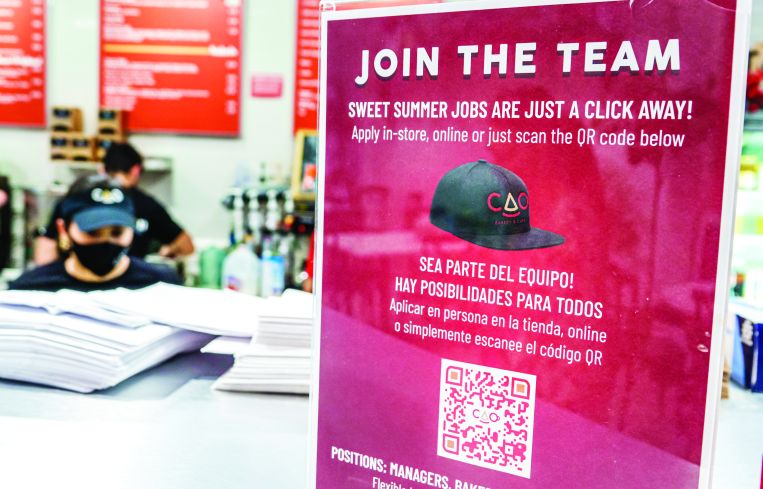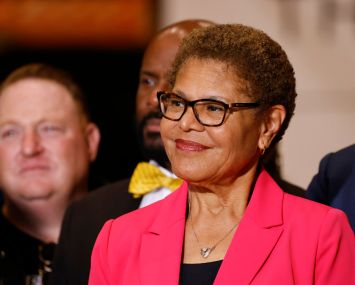Florida Looks to Ease Child Labor Laws With Industry Support
Construction industry wants 16- and 17-year-olds on construction jobs under supervision
By Chava Gourarie February 19, 2024 9:00 am
reprints
Two bills relaxing child labor restrictions are working their way through the Florida legislature, the combination of which could be a boon for the hospitality and construction industries — at the expense of children’s well-being, according to critics.
The first bill (Employment of Minors) would expand the amount of hours that teenagers 16 and older could work during the school year, while the second (Career and Technical Education) would allow them to work on residential construction sites under supervision. The retail and hospitality industries have lobbied for the former measure, while the construction industry roundly supports the latter.
An earlier iteration of the second measure would have allowed 16- and 17-year-olds to work as roofers — ranked as the fourth most dangerous job in the country, according to the U.S. Department of Labor. That proposal was removed prior to the legislative session after a public outcry.
Proponents say both bills would provide opportunities and choice for young people looking to get a head start on their careers. Critics say Florida is endangering minors to fill a work shortage exacerbated by the state’s own anti-immigration policies and rhetoric against both legal immigrants and undocumented migrants.
Separately, the construction industry is also supporting a bill (Employment Regulation) targeting heat protection for outdoor workers. The bill would prevent local jurisdictions from setting their own standards for protecting workers during extreme heat events, such as mandated water breaks — as Miami-Dade County is attempting to do. The industry argument here is that it’s better to avoid a hodgepodge of varying laws, and instead wait for uniform state or federal standards.
All three pieces of legislation had cleared important hurdles while advancing through the Florida legislature as of Feb. 15. The child labor and heat protection pre-emption bill have both been been approved by the House, but still needs to pass the Senate.
The primary child labor bill (HB49, SB1956) follows those of other Republican-led states that have similarly rolled back restrictions on working hours for minors. This has involved lowering the age at which children can work, expanding allowed working hours — including before school and past midnight — and removing protections like mandated breaks.
In Florida, the Senate version is not as extensive as that of the proposed House legislation, which was approved in early February. Both address only minors 16 years old and older, expanding the hours they can work. Current law already allows teenagers to work up to 30 hours a week during the school year, up to six consecutive days, and up to eight hours between 7 a.m. and 11 p.m., on the day before a school day. (These restrictions do not apply to summer or holiday breaks.)
The Senate bill would expand the daily cutoffs to 5:30 a.m. and midnight, but would keep the maximum working time at 30 hours a week during the school year. The House bill allows students to work up to 40 hours a week, and also removes the restrictions on working more than six consecutive days and required breaks after four hours of work.
Florida teen Auxmary Valdez works at a tutoring agency after school, which she fits in on top of soccer, schoolwork and filling out college applications. She’s worried the bill would hinder the education of students like herself. “In the end, it’s education or money,” Valdez told WLRN. “And you do need an education to make money in the future.”
Indeed, teenagers should be allowed to set themselves up for success later in life, said Alexis Tsoukalas of the bipartisan Florida Policy Institute, which opposes the legislation.
“They can’t do that if they’re being overworked, overscheduled, and not getting enough sleep,” she said.
The bills also remove restrictions for home-schooled or remote-learning students and those who leave school at 16 — leaving only the same restrictions that apply to adults. The measure initially prevented local municipalities from enforcing curfews that would conflict with the newly expanded work hours, but that was amended.
The bill is backed by the restaurant and retail industries, including groups like the Florida Restaurant and Lodging Association and the Florida Retail Association, which represent giant corporations such as Walmart, Publix and Disney.
“What we’re doing here is creating a cheap workforce for big business,” Florida Rep. Robin Bartleman, a Democrat from Broward County, said during the House vote.
In fact, the Florida-based conservative think tank Foundation for Government Accountability wrote the draft legislation — passing it to the bill’s sponsor — as it has done in other states as part of a national campaign to rewrite child labor laws, according to the Washington Post.
Groups representing construction interests have not weighed in on the bill.
Proponents say the bill would give teenagers more opportunity, while opponents say existing law already offers the right balance of choice and protection. Supporters have also said that the bill can help with Florida’s labor shortage, a point critics say highlights that this legislation would benefit businesses at the expense of high school students.
“Until we get the right to vote, we are children,” Valdez said. “It is child labor.”
A separate bill would expand the jobs that 16- and 17-year-olds can perform. These would primarily include work on residential construction sites, as long as the minor is not working above 6 feet, is being supervised by a licensed adult, and has a training certification from the federal Occupational Safety and Health Administration (OSHA).
On its face, the legislation is primarily about recruitment into the skilled trades through career education and workforce development policies, which is why industry groups like the Florida Associated Builders & Contractors (ABC) and the Florida Home Builders Association are lobbying for the bill, according to representatives for the groups.
“I think, in our K-12 system now, there’s not a lot of resources given to hands-on, skills-based education,” said Steve Cona III of ABC Gulf Coast. “Everything’s focused on an academic career model, but not meaningful skills that students can actually create careers from.”
Florida already allows 16- and 17-year-olds on job sites if they’re part of an apprenticeship program, or what’s known as career and technical education (CTE) programs, available in much of the state. The bill is meant to level the playing field for kids who don’t have access to those programs, said Rusty Payton, of the Florida Home Builders Association.
“Nobody’s trying to bypass OSHA,” said Payton. “We’re trying to get kids who don’t have access to a CTE job site.”
The current bill is a scaled-down version of the proposal that initially allowed teenagers to work as roofers — which Payton called “a mistake.” The earlier version would almost certainly have violated federal law, which considers construction in general and roofing in particular a hazardous occupation.
The Florida Policy Institute says the current bill as written still violates federal law, since it is too broad to preclude teens from working in jobs considered hazardous and the safety rails in place are not adequate. For example, while teenagers are required to pass the OSHA certification, the Department of Labor itself says that as a “voluntary program” the certification is not sufficient as training.
“Yes, it’s better that you’re not going to let them above 6 feet, but it’s still federal law, and still hazardous, and still too broad,” said Tsoukalas. “Just because you are not on a roof doesn’t mean you’re not on a dangerous [job].”
Federal law does not allow minors to work “in roofing and any work performed on or about a roof,” though federal law does distinguish between minors up to 16, and those older than 16 for some types of work.
These laws are being pushed at a time when the White House is looking to crack down on child labor violations, which have been surging in the country, while federal enforcement remains woefully inadequate. It’s a problem that’s particularly acute in the construction business, which often relies on undocumented immigrant labor, and therefore skirts federal oversight, according to reporting by Commercial Observer.
In addition, a New York Times investigation found that migrant children as young as 13 were working as roofers across the country in 2023 and spoke with 20 minors who were working illegally in the South Florida city of Homestead alone.
Critics of easing employment restrictions for minors also worry about enforcement. Florida Republicans gutted the state’s own Department of Labor back in 2002, and enforcement of child labor laws is now in the hands of the Department of Business and Regulation, which oversees licensing issues. The department has just seven investigators for the entire state for all matters it oversees, according to Tsoukalas. There are no plans to up that count in anticipation of the new labor rules.
“The laws as written are not necessarily the issue,” she said. “It’s enforcement.”
Another Florida bill that the construction industry supports targets local heat protection standards. Previously, the industry rallied against a rule proposed by Miami-Dade County leaders that would mandate water breaks, shade protections and other requirements for outdoor workers, to combat extreme heat.
The primary argument for the bill is that it’s better to wait for a state or federal standard. The federal government, via OSHA, is already working on a federal heat protection standard, though it’s projected to take several years before it’s put into place.
“If there’s going to be a heat standard, it should be a federal standard,” said ABC’s Cona, though he believes the current OSHA standard is sufficient. “We want to make sure there’s one standard. And, whatever standard that is, as someone who represents people all over the state — and it’s hot all over the state — I think there should be one standard, not different standards depending on wherever the building is.”
But, while business interests say they’re waiting for a state or federal standard, Republicans in Tallahassee have killed legislation that would have created a state heat standard every year in the last three years.
Florida’s current bill also prevents local governments’ ability to set prevailing wage standards for their contractors. On the heat proection issue, the Senate version has a deadline, assuming that OSHA will put a standard into place by 2028, while the House bill pre-empts local regulatory attempts outright. Both would derail Miami-Dade’s standard, which would kick in when the heat index reached 95 degrees, and is scheduled to go before county commissioners in the spring.
But not everyone has that kind of time. Since 2020, OSHA has fined five Florida employers for heat-related deaths, and another four for heat-related hospitalizations. To exacerbate matters, in 2023 there were 42 days in which Miami-Dade hit the threshold for extreme heat, at or above 105 degrees, compared to an average of six days per year over the past 14 years.
And 2024 is projected to be even hotter.
Chava Gourarie can be reached at cgourarie@commercialobserver.com.


